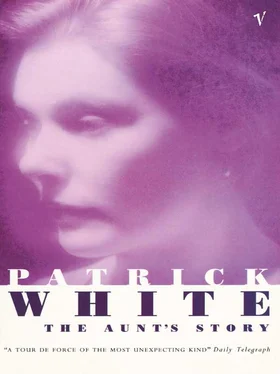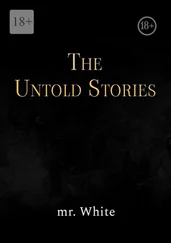Theodora began to have a suspicion that Sokolnikov was a great man. He was the greatest bore. She closed her Testament, which had been given to her by a clergyman in a train near Bournemouth, and prepared to listen to words.
‘All things spring from boredom,’ said Sokolnikov.
He patted each statement like a balloon, not the gay globe of carnival, but a turgid gas balloon, determined to escape from its moorings in a slow wind. Theodora yawned.
‘Do we not work from boredom? Or would, if necessity did not exist. We sing from boredom. We fornicate from boredom. Out of the loneliness of boredom, we marry. Then, as a sop to our bored vanities, we proceed to reproduce. It is even probable that God created Adam on a rainy day.’
‘I cannot confirm that,’ Theodora said.
‘But you can save me, Ludmilla, I beseech you, please. Let us make conversation and debauch ourselves interestingly for many hours. It is most stimulating.’
‘Go, Alyosha Sergei!’ she cried. ‘You are a bore.’
But she came, as she had always come to Alyosha Sergei, her man’s boots on a board floor. They were, in fact, that complementary curse and blessing, a relationship.
‘Yes,’ she sighed, ‘I shall come. If it will settle anything.’
‘Nothing settles,’ belched Sokolnikov. ‘It always rises, again and again.’
Theodora followed him down the passage, and the whole darkness lunged and plunged as if it might soon tear free. The passage was full of wind. But the room into which they walked, after a last lurch and a last righting, the room at least was moored.
‘I shall pour out a little one for the saints,’ said Alyosha Sergei. ‘Do not accuse me, Ludmilla. It is far too late.’
It was too late for clocks. It was the hour for rubber words. She watched the glass under his hand become solid as he poured, glitter, quiver solemnly for a moment, and dissolve into shapelessness.
‘There, Ludmilla,’ the General said.
Together they watched the lovely lake, which was most necessary and natural. Theodora knew now that it could not have been otherwise, the endless, brimming, shivering glass, and the little, passive, touching lake. There were other things as well. There was the carcass of a duck. There were the smoked sprats that came from somewhere else in wooden boxes. The sprats were stiff and glazed in their wooden boxes on the table in the General’s room.
‘I have been making a small meal,’ said Alyosha Sergei, and, even now, he broke the heads off several sprats and stuffed them into his mouth.
‘You are an odious and repulsive glutton, Alyosha Sergei.’
But her words were worn by much use and had a certain shabby tenderness.
‘Now you speak like Anna Stepanovna,’ said Aylosha Sergei.
His mouth quivered, rejecting the tails of several sprats, and an enormous bitterness that he had not bargained for.
‘They say they tore down the little pavilion beside the lake. They used it for firewood the following winter. Anna Stepanovna protested, but her argument was ineffectual.’
‘And the pavilion was rotten,’ said Theodora remorselessly. ‘On one side the lattice had broken loose. When there was a wind it flapped.’
‘Yes,’ said Alyosha Sergei. ‘The pavilion was rotten.’
So the pavilion was reduced to smoke. Theodora’s eyes smarted. She remembered the silver bellies of the trees that the wind tumbled beside the lake in summer. It was not possible to reduce the melancholy ripple of the leaves.
‘It was, of course, right, Ludmilla. And they strung up Anna Stepanovna to her own trees for eating her own chickens. And they wiped the frozen snot off their faces with pieces of embroidery that she had spent years pricking and torturing out of canvas. And they burned the house, which certainly had patches of damp on the ceilings, and worm in much of the wood. But none the less, one must admit, the rightness of certain acts is a melancholy fact.’
Emptying his mouth of all this, Alyosha Sergei began to feel the need for putting something inside. He fished in the carcass of the duck for its liver and placed it carefully on his tongue. Theodora bent forward, because it was time she also did something to dissolve her own hard shape. She bent and took the glass which had stood waiting amongst the skeleton fish, on the edges of the lake. She took the glass and it trembled clearly in her hand. The little glass had a clear and innocent beauty, before which she could not humble herself enough.
‘How right it is,’ she said.
‘What is?’
‘Finally, almost everything,’ Theodora said.
‘You are a fool or a saint, Ludmilla,’ said Alyosha Sergei.
She was nothing that she knew. She drank the glass of vodka and the room sprang closer. These walls, too, had naked swords, but the blades jagged from attacking the heads of bottles, and the wires from which they hung had rusted in the sea air. He had arranged his boots against the skirting, where they glared, toeing the line. On the bed there was a cotton bedspread, of large, open, though intricate pattern, which Theodora felt she must eventually unravel.
‘A fool or a saint,’ said Alyosha Sergei. ‘And I, I have so much food inside my belly it has begun to ache.’
He laid his head sideways on the table amongst the skeletons of fish. He began to snore, releasing a great deal of wind through endless ramifications of rubber.
Alyosha Sergei is a pig, a pig, breathed Theodora, who at times could not contain disgust, and particularly now, watching the motion of pig’s bristles on the smooth pink rubber skin. Littered with squalor, she said, brushing from her skirt the wishbone of the duck.
It irritated her more to remember his pig’s chest, that he had bared for greater comfort, and it was white and flabby as the scraped carcass of a pig, on which meandered two or three grey, ridiculous, forgotten hairs. Now that he lay with his head in the trough, his chest was covered, but it remained a grudge to be jealously nursed. The bile came in her mouth. She could feel that her face was leathern and yellow, and she realized that she had not taken her camomile tea.
Wake up, you swine, she would have shouted, at any moment, she would have banged her flat hands on a gap in the table, or kicked him with her boot.
‘Ludmilla, you are going to accuse me,’ said Alyosha Sergei.
He sat up, or half, and the backbone of a sprat trembled fatuously on a whisker.
‘I should say so,’ she said. ‘You were snoring like a pig.’
She could not make it pointed enough, her hateful bodkin.
‘You, who never sleep,’ she said.
‘I was thinking,’ said Alyosha Sergei.
‘Then it is a great blessing,’ she said, ‘that the majority of mankind does not.’
But it was unequal, her voice knew.
‘It is time we were going,’ she said more gently.
It was unequal, because the room, with the ceiling which had been fumed over by Alyosha Sergei’s voice, and the black portraits, and the golden saints, and the other rooms, which creaked with emptiness and mice, the whole empty, expectant house was full of that desperate affection which she had never quite been able to give. So that now, on the point of leaving, her mouth trembled, and expressed something shapeless that was neither hatred nor love.
‘Of course, we are going,’ said Alyosha Sergei.
Now that the streets were quiet all emotion was unconvincing. It was several hours since the breath had come and gone in spasms, and that astonishing scene of men turning to wax in the gutters. But you could no longer hear the cries gush from paving stones. Now the silence lay in pools. It had quite congealed.
‘In three hours we shall reach P—, if we are fortunate,’ said Alyosha Sergei. ‘There we should meet Tomokin and Michael Ivanich.’
Читать дальше












